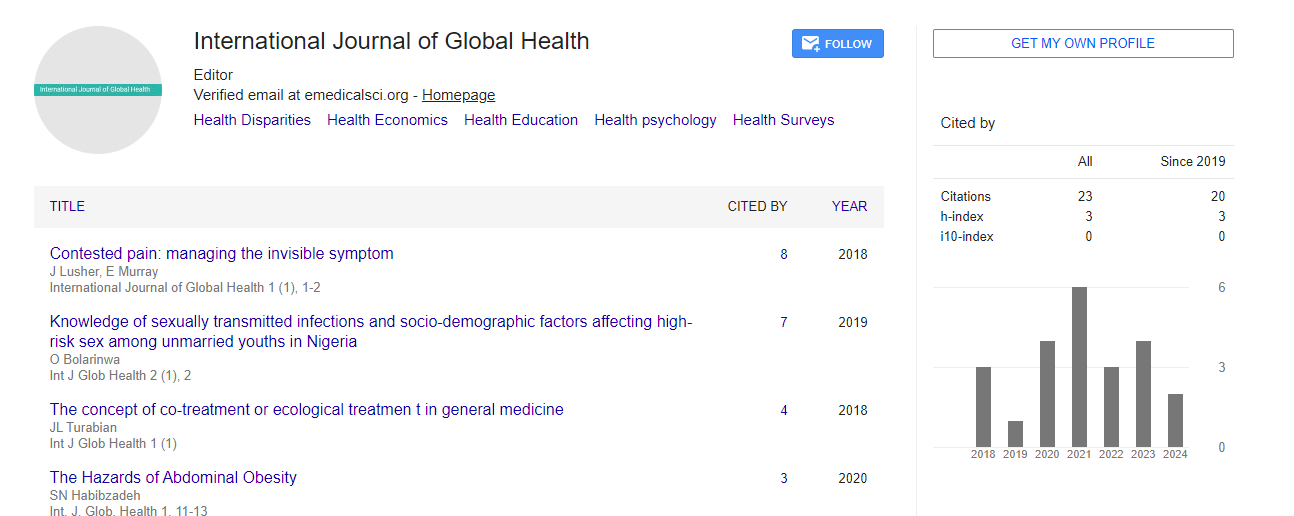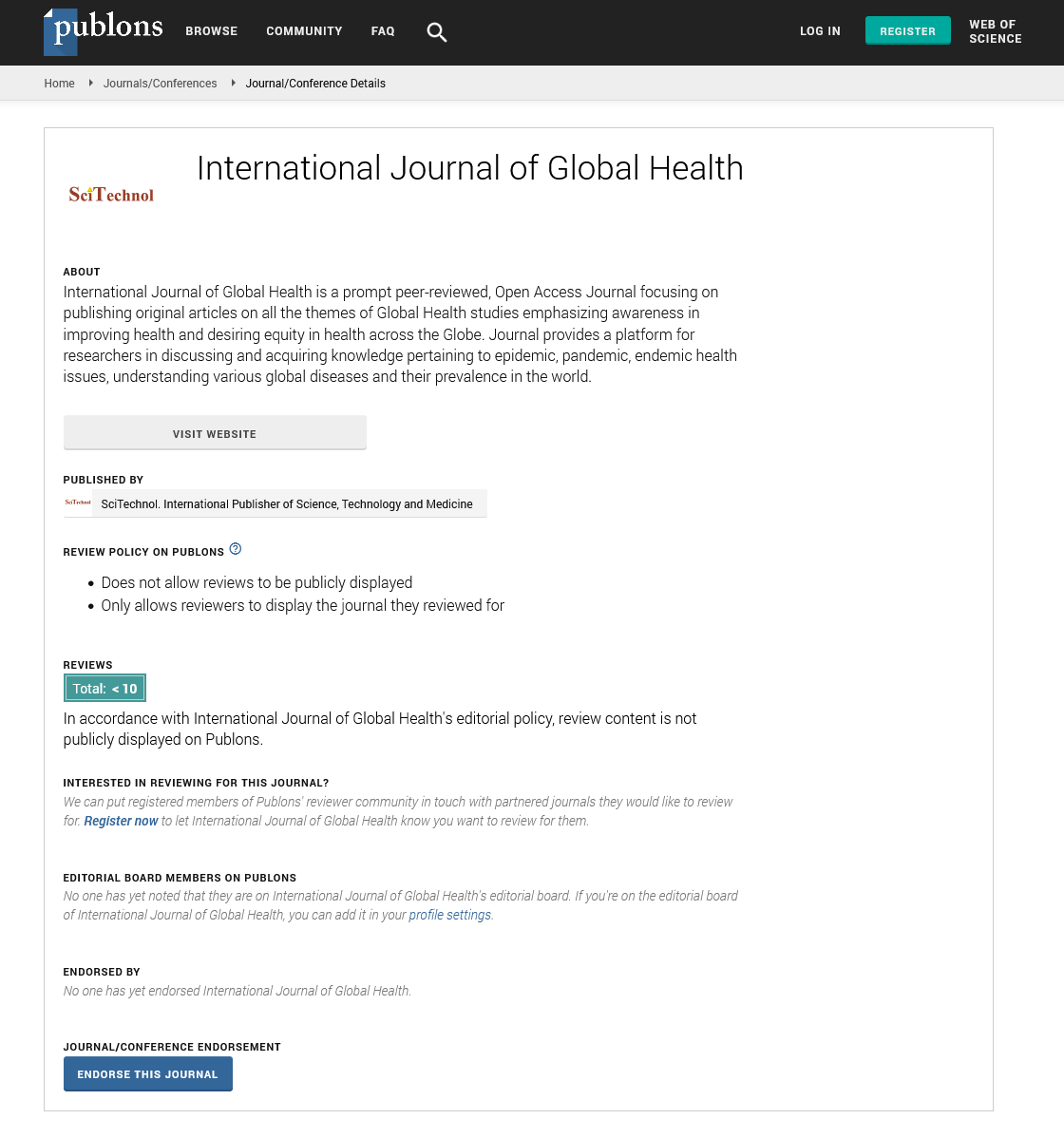Commentary, Int J Glob Health Vol: 7 Issue: 3
Therapies for Trauma Management: A Comprehensive Overview
Eugene Tuyishime*
1Department of Critical Care, University of California, San Francisco, United States of America
*Corresponding Author: Eugene Tuyishime,
Department of Critical Care,
University of California, San Francisco, United States of America
E-mail: Eugene.tu@uc.edu
Received date: 26 August, 2024 Manuscript No. IJGH-24-148995;
Editor assigned date: 28 August, 2024, PreQC No. IJGH-24-148995 (PQ);
Reviewed date: 11 September, 2024, QC No. IJGH-24-148995;
Revised date: 19 September, 2024, Manuscript No. IJGH-24-148995 (R);
Published date: 25 September, 2024, DOI: 10.4172/Ijgh.1000213.
Citation: Tuyishime E (2024) Therapies for Trauma Management: A Comprehensive Overview. Int J Glob Health 7:3.
Abstract
Description
Trauma, defined as a physical injury or psychological damage resulting from an event or series of events, poses significant challenges in healthcare. Trauma can be categorized into physical trauma (such as fractures, lacerations and internal injuries) and psychological trauma (such as post-traumatic stress disorder, or PTSD). Effective management of trauma is significant to ensure recovery, minimize complications and enhance quality of life. This study provides an overview of various therapeutic approaches to trauma management, focusing on both physical and psychological aspects. The management of physical trauma begins with an initial assessment following the principles of Advanced Trauma Life Support (ATLS). This includes primary survey of airway ensuring patency and protecting the cervical spine. Breathing assessing respiratory function and providing oxygen if needed. Circulation evaluating circulation and controlling hemorrhage. Disability checking neurological status. Exposing the patient for a thorough examination while preventing hypothermia.
Surgery is often necessary for trauma patients, especially in cases of hemorrhage control surgical intervention may be required to control internal bleeding, particularly in cases of liver or splenic injuries. For fracture stabilization, Open Reduction and Internal Fixation (ORIF) or external fixation are common surgical techniques used to stabilize fractures. In cases of open fractures or contaminated wounds, surgical debridement is essential to remove necrotic tissue and prevent infection. Effective pain management is essential for trauma patients. Pharmacological treatments like Non-Steroidal Anti-Inflammatory Drugs (NSAIDs) for mild to moderate pain. Opioids for severe pain, but with caution due to the risk of addiction and side effects. Adjunctive medications such as muscle relaxants or anticonvulsants for neuropathic pain. Non-Pharmacological Treatments like physical therapy assists in rehabilitation and recovery, focusing on restoring mobility and function. Cognitive Behavioral Therapy (CBT) can help manage pain perception and improve coping strategies.
Rehabilitation
Rehabilitation is essential in the recovery process for trauma patients. Focused on restoring strength, range of motion and functionality. Aimed at helping patients return to daily activities and improving their quality of life. For patients with traumatic brain injuries or those who have undergone throat surgery. Psychological First Aid (PFA) is a method used to address the immediate psychological needs of trauma survivors. Key components includes ensuring the person feels safe and supported. Providing a space for individuals to share their experiences. Offering practical assistance and connecting individuals to mental health resources. Cognitive Behavioural Therapy (CBT) is a widely used therapeutic approach for individuals experiencing psychological trauma. Helping patients recognize and challenge irrational beliefs related to their trauma. Teaching patients techniques to manage anxiety, stress and other emotional responses. Gradual exposure to trauma-related stimuli to reduce avoidance behavior and desensitize patients to their fears.
Eye Movement Desensitization and Reprocessing (EMDR) is an innovative therapy specifically designed for trauma. Using guided eye movements or other forms of rhythmic stimulation while recalling traumatic memories, facilitating the processing of distressing thoughts. Helping individuals reduce the emotional charge of traumatic memories. Pharmacotherapy may be necessary for individuals with significant psychological symptoms. Commonly used medications includes Selective Serotonin Reuptake Inhibitors (SSRIs) such as sertraline or fluoxetine, effective for Post Traumatic Syndrome Disorders (PTSD) and anxiety disorders. Benzodiazepines may provide short-term relief for acute anxiety but are not recommended for longterm use due to dependency risks.
Effective trauma management often requires a multidisciplinary approach involving various healthcare professionals, Emergency Medical Services (EMS) for initial assessment and stabilization in the field. Surgeons for surgical interventions. Psychologists/Psychiatrists for mental health assessment and therapy. Rehabilitation specialists to aid in recovery and improve quality of life. Community resources play a vital role in trauma recovery. Support groups, community services and educational programs can help individuals navigate the challenges of recovery. Social support is associated with better mental health outcomes and can significantly impact the healing process.
Conclusion
Trauma management is a complex process that requires a comprehensive approach encompassing both physical and psychological aspects. Effective management strategies, including initial assessment, surgical interventions, rehabilitation and psychological therapies, are vital in promoting recovery and improving patient outcomes. A multidisciplinary approach, along with strong community support, enhances the healing process and fosters resilience among trauma survivors. Continued research and innovation in trauma therapies will further advance our understanding and treatment of trauma-related conditions, ultimately improving quality of life for affected individuals.
 Spanish
Spanish  Chinese
Chinese  Russian
Russian  German
German  French
French  Japanese
Japanese  Portuguese
Portuguese  Hindi
Hindi 
